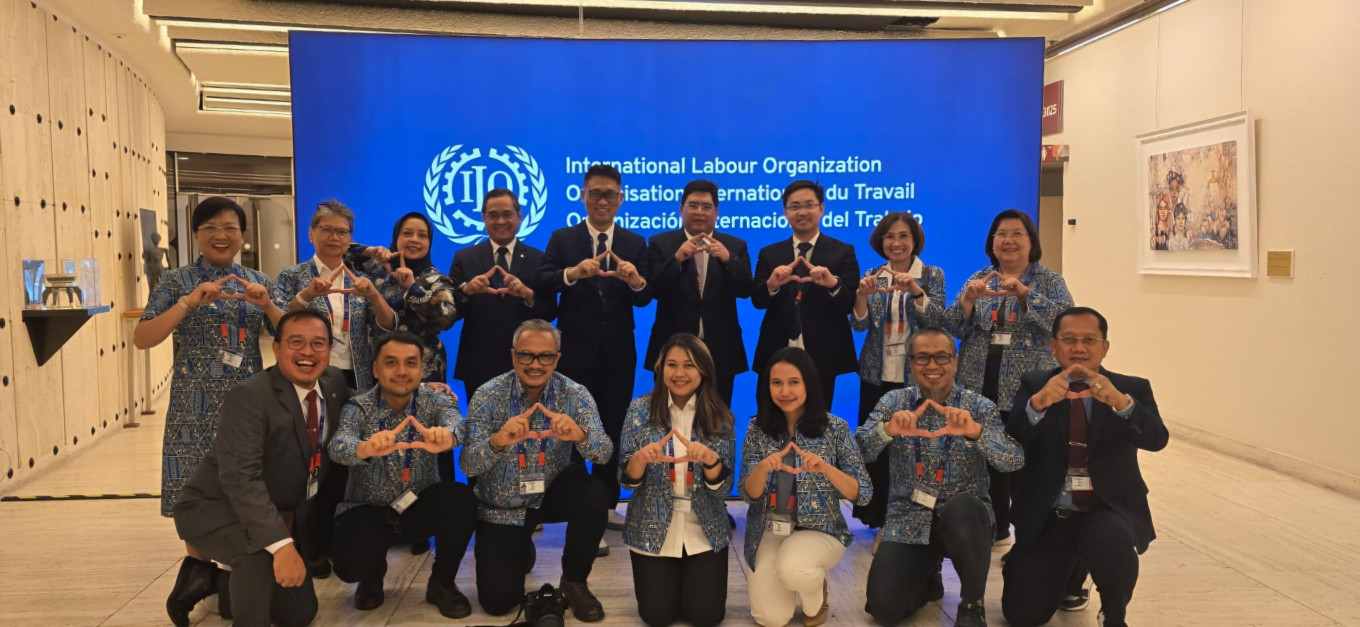Popular Reads
Top Results
Can't find what you're looking for?
View all search resultsPopular Reads
Top Results
Can't find what you're looking for?
View all search resultsAPINDO: Global framework for platform workers must be adaptive, support MSMEs
Change text size
Gift Premium Articles
to Anyone
A
global policy discussion on the digital economy at the 113th International Labour Conference (ILC) received strong support for a legally binding convention, with the Indonesian Employers Association (APINDO) emphasizing the need for an adaptive, realistic and supportive instrument for the e-commerce ecosystem.
The Standard-Setting Committee of the International Labour Organization (ILO) launched its inaugural discussion this year under the theme “Decent Work in the Platform Economy”, which convened tripartite delegations from various countries on June 2-13 at the Palais des Nations in Geneva, Switzerland.
APINDO, representing Indonesia’s business community, said in a statement that it attended as part of the country’s tripartite delegation alongside government and trade union representatives.
The committee spent two full days debating the type of instrument for standardizing the sector. Most countries in Europe, Latin America and Africa supported a legally binding convention aligned with their existing labor systems.
Countries with the largest populations of platform workers, such as China, the United States, India, Switzerland and Japan, advocated for a more flexible recommendation that could be tailored to the national context, highlighting that the majority of global platform workers were self-employed. These countries also stressed the need to safeguard micro, small and medium enterprises (MSMEs) that relied heavily on the digital economy from overly rigid regulation.
All tripartite delegations agreed on the importance of ensuring comprehensive protections for both workers and a sustainable platform ecosystem, including MSMEs.
Consequently, a principles-based approach was adopted to ensure that the proposed instrument remained flexible and adaptable to the national context of each country.
Convention
Although the committee eventually agreed that the outcome would take the form of a convention, only around 15 percent of the substantive content has been discussed, with a final agreement yet to be reached.
This underscores the complexity of the issue and the need for a cautious approach to ensure that any resulting instrument supports rather than hampers digital economy growth, while respecting each country’s legal and employment frameworks.
Over the two-week negotiation period, the delegations agreed that the definition of platform workers should include service providers on platforms, whether in an employment relationship, self-employment or other category depending on the national context.
The discussion revealed the absence of a default presumption that all platform workers should be classified as employees. The instrument must also respect each country’s labor and business laws.
The scope of the discussion also extended beyond location-based platforms such as transportation and delivery services to include online platforms operating in sectors such as telehealth, digital tourism, edutech, freelance work and creative industries.
Ewa Staworzynska, spokesperson of the US employers’ group, highlighted key points for the upcoming round of negotiations.
First, regulations must acknowledge diverse forms of employment status under national laws and avoid homogenizing the rights and obligations of employees as well as self-employed workers.
Second, occupational safety and health (OSH) standards must be adapted to the flexibility needs of workers who operate across multiple platforms.
Third, all platform workers should be guaranteed access to social protection through schemes that align with their legal employment status and the national context.
Lastly, regulations must support the growth of platform ecosystems, including MSMEs and entrepreneurs, without unduly stifling innovation, for instance through overly restrictive oversight of platform algorithm use.
“This first year of standard-setting discussions has clearly demonstrated the inherent complexity of the subject matter. It has also reaffirmed the indispensable value of social dialogue in navigating such complexity.” Staworzynska said.
“It is incumbent upon governments and social partners alike to elevate the level of understanding regarding the far-reaching implications of the issues under consideration,” she said.
“The ILO must remain the organization for providing general guidance on whether and how to legislate, while recognizing that no single regulatory model is universally applicable. This organization should not be a venue for advancing national or regional legislative agendas at the expense of international consensus,” she continued.
“We must focus on the most common denominators able to accommodate all national realities. Flexibility, mutual respect and a genuine commitment to dialogue will be essential in forging an instrument that is balanced, implementable and ultimately effective.”
APINDO said it fully supported these principles and was committed to advocating for a global instrument that was adaptive and inclusive as well as promoted economic growth, including the digital economy, without placing undue burdens on businesses.
During the plenary session of the ILC, Bob Azam, head of employment at APINDO who represented the Indonesia employers’ group, highlighted that global conditions remained challenging with ongoing uncertainties in trade, exchange rate pressures and rising domestic production costs.
“These factors have taken a toll on labor-intensive sectors, forcing some to reduce their workforce,” said Bob, noting that despite these headwinds, Indonesia’s economy remained resilient and recorded 4.87 percent growth in the first quarter of 2024.
“However, employment challenges persist, with 7.47 million unemployed, 11.56 million underemployed and a high proportion of workers in the informal sector,” he said.
According to Statistics Indonesia (BPS), the open unemployment rate is 4.91 percent.
The administration of President Prabowo Subianto had made job creation a top priority, targeting 8 percent economic growth and 19 million new jobs, Bob continued.
To achieve this, businesses and workers must be engaged as strategic partners, particularly in harnessing the potential of the digital economy, which is projected to grow from US$82 billion in 2023 to $360 billion by 2030, with Indonesia accounting for one-third of the ASEAN digital economy.
“The principles of decent work in the platform economy must be carefully designed so as not to hinder flexibility and innovation, two critical drivers of digital era job creation,” he said.
“The business community hopes the ILO will develop an instrument that protects workers without imposing conventional employment models.”










